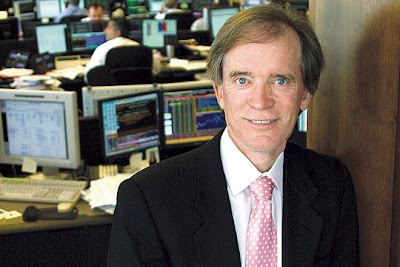
Yesterday one of the big stories circulating around the blogosphere was the labeled anti-Fed diatribes of two top asset managers: Pimco’s Bill Gross and Jeremy Grantham of Grantham Mayo Otterloo & Co. While Grantham’s ‘critique’ was somewhat in character, the strong words from supposed Fed crony Gross, where I will focus my commentary in this post, came as a considerable shock. In reality, however, Gross’ testimony was not anti-Fed at all, but more accurately a an indictment of American politics and society.
Gross, in his monthly newsletter, announced his opinion that the November Fed announcement could mark the end of a great 30-year bull market in bonds, and that fund managers of all types would need to adjust to a new environment.
“…I must admit it may be similar to a Turkey looking forward to a Thanksgiving Day celebration. Bondholders, while immediate beneficiaries, will likely eventually be delivered on a platter to more fortunate celebrants, be they financial asset classes more adaptable to inflation such as stocks or commodities, or perhaps the average American on Main Street who might benefit from a hoped-for rise in job growth or simply a boost in nominal wages, however deceptive the illusion.”
Grantham and Gross criticized the Fed for loose monetary policy and warned that renewed asset purchases would likely be ineffective while running the risk of high future inflation. Gross, as he continued, even wielded the vaunted ‘p’ word.
“Check writing in the trillions is not a bondholder’s friend. It is in fact inflationary, and, if truth be told, somewhat of a Ponzi scheme. It raises bond prices and creates the illusion of high annual returns, but ultimately it reaches a dead end where those prices no longer go up.”
The Fed has accomplished its goal of propping up asset prices in the near-term, but long term consequences are unknown. Further quantitative easing by the Fed would be one of the greatest scientific experiments of all time, all with taxpayer prosperity and livelihood at stake. Gross wrote:
“We are, as even some Fed Governors now publicly admit, in a ‘liquidity trap’, where interest rates or trillions in QEII asset purchases may not stimulate borrowing or lending because consumer demand is just not there. Escaping from a liquidity trap may be impossible, much like light trapped in a black hole.”
Gross does not pile all of the blame on Ben Bernanke, however, but rather feels our problems amount to a lack of accountability among the American pubic and the failure of our corrupt political establishment.
“This was not a Bernanke scheme, because this is his only alternative and he shares no responsibility for its origin. I call it a Sammy scheme, in honor of Uncle Sam and the politicians–as well as citizens–who have brought us to this critical moment in time. You and I, and the politicians that we elect every two years, deserve all the blame.”
Gross’ commentary, on the surface, was certainly surprising, but does nothing to cancel out his previous opinions on the market. A common theme I have touched in several posts and in several comments on this blog is the idea, first enunciated by Ned Davis, of: do you want to be right or make money? Pimco, no matter how displeased with the current state of the economy or the actions of our politicians, has an implicit duty to seek return. Following the Fed retreat in Jackson Hole in late August, it became abundantly clear to perceptive fund managers that the Fed stood ready to prop up asset prices if need be. The result has been a precipitous climb in the market that has been further buoyed by a strong earnings season. Our problems will come to roost at some point in the future, but I do not believe they will be anywhere near as extreme as the most fervent doom and gloomers deem them to be. Gross saw the opportunity to jump on the gravy train, but that doesn’t mean the environment can’t change, as he notes. So what if massive QE2 is priced in and it doesn’t come? A pull-back in this market would be healthy, and a prudent money manager or active trader is ready for, even thirsting for, such a scenario to buy assets at more reasonable prices. Even with a pull-back there is certainly still an opportunity to hold, as part of your balanced portfolio a group of quality U.S. and emerging market companies long-term. In general terms, however, I will lighten my long load, take profits and hedge positions into the Fed meeting. There was no reason to endure pain trying to short during this recent telegraphed market rally, but that doesn’t mean the market is invincible forever.
Click here or the full Pimco investment letter from Bill Gross.



